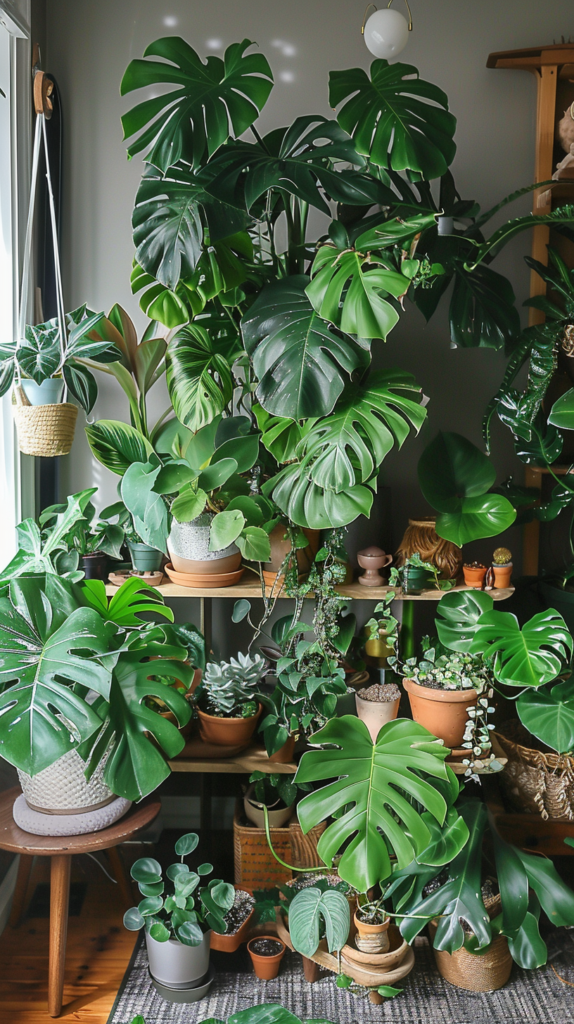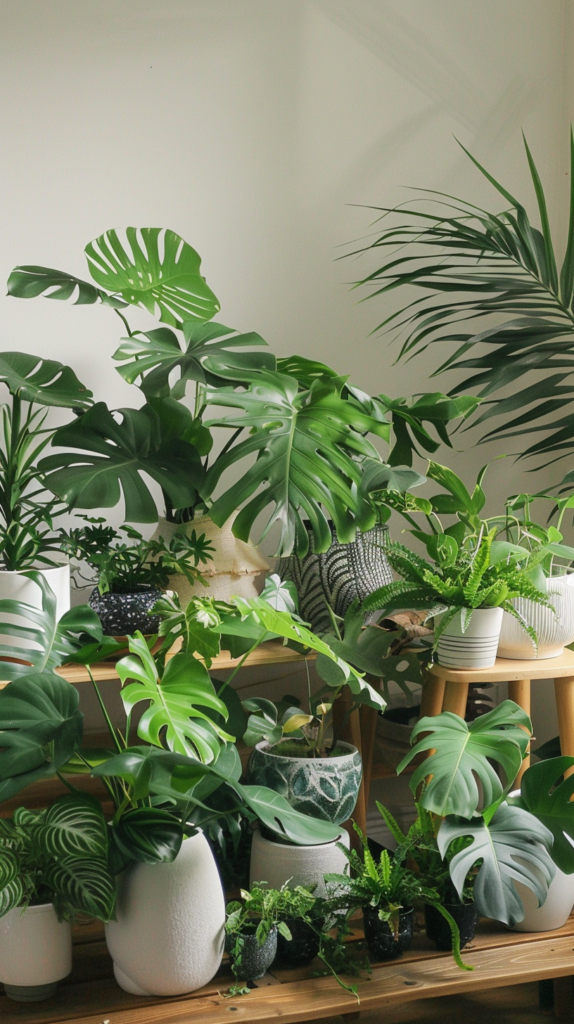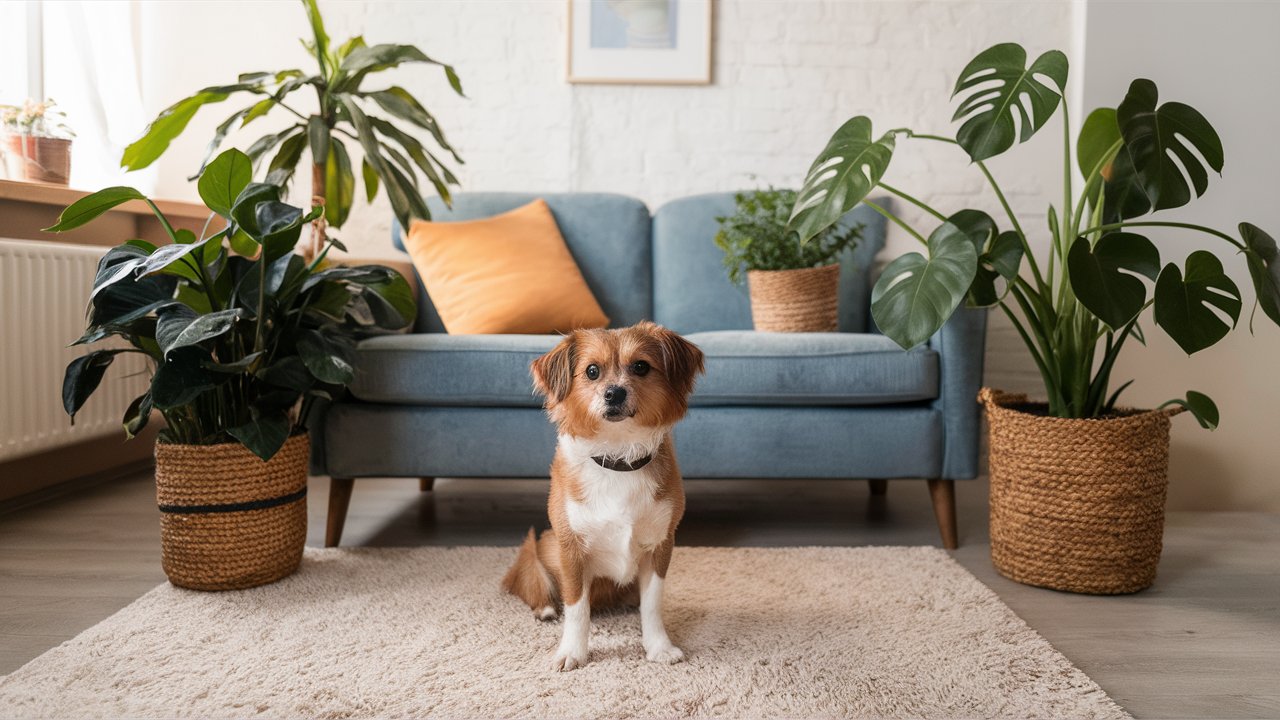Disclosure: Some links on this site are affiliate links. As Amazon Associates, we earn from qualifying purchases (at no cost to you).
So, you’ve decked out your home with stunning Monstera plants, and they look absolutely fabulous. But one day, you catch your dog giving those big, holey leaves a suspicious sniff.
Suddenly, a thought hits you: “Are Monstera plants toxic to cats and dogs? Well, here’s what you need to know. And the answer may actually surprise you.
About Monstera Plants
Monstera plants, also known as Swiss Cheese Plants, are a hot favorite among plant lovers for their unique, holey leaves and tropical vibes.

But, as a responsible pet owner, it’s essential to know if your gorgeous green buddy could pose a threat to your cats or dogs.
Are Monstera Plants Toxic?
Yes, Monstera plants are indeed toxic to both cats and dogs.
The culprit? Insoluble calcium oxalates. These little crystals can cause some serious discomfort and health issues if ingested by your furry friends.
When a pet chews on the leaves or stems, these crystals can penetrate the soft tissues of their mouth, throat, and stomach, leading to various symptoms.

Symptoms of Monstera Plant Poisoning
If your cat or dog happens to nibble on a Monstera plant, here are some symptoms you might notice:
- Drooling: One of the first signs. Your pet might start drooling excessively as the crystals irritate their mouth.
- Oral Pain: Expect to see your pet pawing at their mouth or refusing to eat due to the pain.
- Swelling: Swelling of the mouth, tongue, and lips is common.
- Vomiting: Your pet may vomit as their body tries to expel the irritating substance.
- Difficulty Swallowing: The irritation can make swallowing painful and difficult.
While these symptoms are uncomfortable and distressing, they are usually not life-threatening. However, it’s crucial to act quickly to alleviate your pet’s discomfort.

What to Do if Your Pet Eats a Monstera Plant
If you suspect your cat or dog has ingested part of a Monstera plant, here are the steps you should take:
- Remove Access: Immediately take the plant away to prevent further ingestion.
- Rinse Their Mouth: If possible, gently rinse your pet’s mouth with water to remove any plant residue.
- Contact Your Vet: Call your veterinarian for advice. They might recommend bringing your pet in for a check-up, especially if the symptoms are severe.
- Monitor Symptoms: Keep a close eye on your pet for any worsening symptoms or signs of distress.
- Hydration: Ensure your pet stays hydrated, as vomiting and drooling can lead to dehydration.

How to Keep Your Pets Safe Around Monstera Plants
Now that you know Monstera plants can be toxic, it’s important to take steps to keep your pets safe. Here are some tips:
- Placement: Keep your Monstera plants out of reach. High shelves, hanging planters, or rooms your pets don’t have access to are good options.
- Training: Train your pets to avoid chewing on plants. This can be challenging, but with consistency, it’s possible.
- Pet-Safe Alternatives: Consider placing pet-safe plants like spider plants, Boston ferns, or areca palms within their reach.
- Deterrents: Use pet-safe deterrent sprays on your plants. These sprays have a bitter taste that discourages pets from chewing on them.
- Supervision: Keep an eye on your pets when they are around plants, especially if they have a history of chewing on things they shouldn’t.

Pet-Safe Alternatives to Monstera Plants
If you’re worried about the risks, consider these pet-safe alternatives that still bring a tropical feel to your home:
- Spider Plant: These are non-toxic and easy to care for, with lovely arching leaves that can add a green touch to any space.
- Boston Fern: These ferns are safe for pets and add a lush, full look to your home.
- Areca Palm: This palm is non-toxic and provides a tropical vibe without the risk.
- Calathea: Known for their stunning leaves, Calatheas are safe for pets and can be a beautiful addition to your indoor garden.
FAQ
1. What parts of the Monstera plant are toxic to pets?
The leaves, stems, and roots of the Monstera plant all contain insoluble calcium oxalates, which are toxic to pets if ingested.
2. How much Monstera plant does a pet need to eat to get sick?
Even a small amount can cause discomfort and symptoms such as drooling, vomiting, and oral pain. It’s best to prevent any ingestion at all.

3. Can Monstera toxicity be fatal to cats and dogs?
While Monstera ingestion typically causes discomfort and symptoms, it is usually not fatal. However, severe cases or complications like dehydration from vomiting can be serious and require veterinary attention.
4. How quickly do symptoms appear after a pet ingests Monstera?
Symptoms can appear within minutes to a few hours after ingestion. It’s important to act quickly if you notice your pet chewing on the plant.
5. Are there any home remedies for Monstera plant poisoning in pets?
While rinsing your pet’s mouth with water can help alleviate immediate discomfort, it is crucial to contact your veterinarian for proper advice and treatment.
6. How can I make my Monstera plant less accessible to my pets?
Place your Monstera plant on high shelves, hang it in a plant holder out of reach, or keep it in rooms that your pets do not have access to.
7. Are there any visual signs that my pet has chewed on a Monstera plant?
Yes, look for damaged leaves with bite marks, and check your pet’s mouth for signs of irritation, swelling, or excessive drooling.
8. Can other houseplants have similar toxic effects on pets?
Yes, many houseplants, such as philodendrons, peace lilies, and pothos, also contain calcium oxalates or other toxic compounds. Always check the toxicity of plants before bringing them into a home with pets.

Final Thoughts
While Monstera plants can add a gorgeous touch to your home decor, it’s important to be aware of their potential risks to your pets.
By taking precautions and knowing what to do in case of an accidental nibble, you can enjoy your Monstera and keep your furry friends safe.
Always consider pet-safe alternatives if you’re particularly concerned about plant toxicity.


